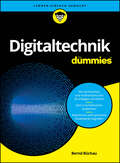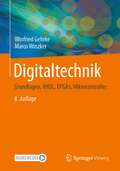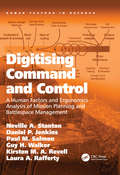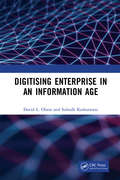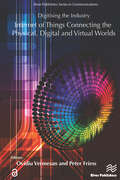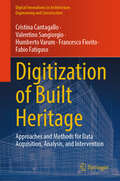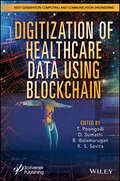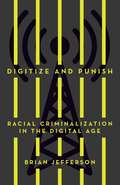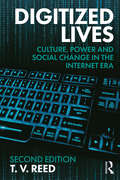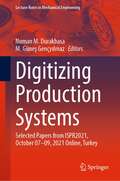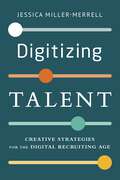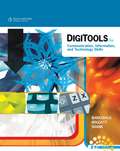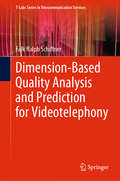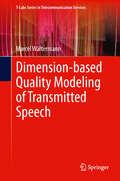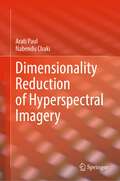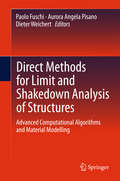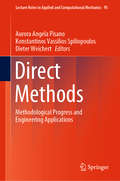- Table View
- List View
Digitaltechnik für Dummies (Für Dummies)
by Bernd BüchauVon den Grundlagen der Boole’schen Algebra bis zur Synthese digitaler Systeme Die Digitaltechnik stellt heute praktisch für alle elektrischen und elektronischen Geräte des täglichen Lebens und in der industriellen Anwendung die Basis dar—deswegen ist sie so wichtig und unverzichtbar. Deshalb ist dieses Gebiet auf möglichst verständliche und vollständige Weise im vorliegenden Lehr- und Übungsbuch behandelt worden. Auch wenn es manchmal kniffelig wird, keine Angst, der Autor führt Sie sicher durch dieses Gebiet zum Ziel, mit fundierten Grundlagen und vielen Beispielen sowie Übungen. Als Interessierter wie auch als Studierender werden Sie mit den vielen Übungen zuverlässig auf die Praxis und anstehende Prüfungen vorbereitet – viel Erfolg. Sie erfahren Was die Digitaltechnik in Theorie und Praxis ist Welche mathematischen Grundlagen Sie benötigen Wie eine Analyse durchgeführt wird Wie eine Synthese einer digitalen Schaltung erfolgt
Digitaltechnik: Grundlagen, VHDL, FPGAs, Mikrocontroller
by Winfried Gehrke Marco WinzkerModerne Digitaltechnik, umfassend und kompakt: Dieses Lehr- und Übungsbuch spannt den Bogen von den Grundlagen der Digitaltechnik über den Entwurf mit VHDL und Komponenten digitaler Systeme bis zu modernen Mikrocontrollern der STM32-Serie.Digitale Grundelemente wie Logikgatter und Flip-FlopsKombinatorische und sequenzielle SchaltungenSchaltungsentwurf und Simulation mit VHDLProgrammierbare Logikbausteine: CPLDs, FPGAsHalbleiterspeicherA/D- und D/A-UmsetzerArchitektur von MikroprozessorenProgrammierung von Arm® CortexTM Mikroprozessoren in C und Assembler32-Bit-Mikrocontroller der STM32-FamilieFunktion und Programmierung von STM32-Peripheriemodulen Die 8. Auflage wurde aktualisiert und die Themenbereiche Mikroprozessoren und Mikrocontroller grundlegend überarbeitet.Zahlreiche Beispiele erleichtern das Verständnis. Viele Übungsaufgaben mit Musterlösungen unterstützen die Lernkontrolle und stehen zu jedem Kapitel zur Verfügung. Ergänzendes Material wird auf der Webseite zum Buch angeboten.Das Buch ist so konzipiert, dass es sowohl als Begleitlektüre von Lehrveranstaltungen als auch für das Selbststudium in den Bereichen Digitaltechnik, Mikrocontroller und Systementwurf geeignet ist.
Digitisation of Culture: Namibian and International Perspectives
by Dharm Singh Jat Jürgen Sieck Hippolyte N'Sung-Nza Muyingi Heike Winschiers-Theophilus Anicia Peters Shawulu NggadaThis book explores the digitization of culture as a means of experiencing and understanding cultural heritage in Namibia and from international perspectives. It provides various views and perspectives on the digitization of culture, the goal being to stimulate further research, and to rapidly disseminate related discoveries. Aspects covered here include: virtual and augmented reality, audio and video technology, art, multimedia and digital media integration, cross-media technologies, modeling, visualization and interaction as a means of experiencing and grasping cultural heritage. Over the past few decades, digitization has profoundly changed our cultural experience, not only in terms of digital technology-based access, production and dissemination, but also in terms of participation and creation, and learning and partaking in a knowledge society. Computing researchers have developed a wealth of new digital systems for preserving, sharing and interacting with cultural resources. The book provides important information and tools for policy makers, knowledge experts, cultural and creative industries, communication scientists, professionals, educators, librarians and artists, as well as computing scientists and engineers conducting research on cultural topics.
Digitising Command and Control: A Human Factors and Ergonomics Analysis of Mission Planning and Battlespace Management (Human Factors in Defence)
by Daniel P. Jenkins Neville A. Stanton Guy H. Walker Paul M. Salmon Kirsten M. Revell Laura A. RaffertyThis book presents a human factors and ergonomics evaluation of a digital Mission Planning and Battle-space Management (MP/BM) system. An emphasis was placed on the activities at the Brigade (Bde) and the Battle Group (BG) headquarters (HQ) levels. The analysts distributed their time evenly between these two locations. The human factors team from Brunel University, as part of the HFI DTC, undertook a multi-faceted approach to the investigation, including: - observation of people using the traditional analogue MP/BM processes in the course of their work - cognitive work analysis of the digital MP/BM system - analysis of the tasks and goal structure required by the digital MP/BM - assessment against a usability questionnaire - analysis of the distributed situation awareness - an environmental survey. The book concludes with a summary of the research project's findings and offers many valuable insights. For example, the recommendations for short-term improvements in the current generation of digital MP/BM system address general design improvements, user-interface design improvements, hardware improvements, infrastructure improvements and support improvements. In looking forward to the next generation digital MP/BM systems, general human factors design principles are presented and human factors issues in digitising mission planning are considered.
Digitising Enterprise in an Information Age
by David L. Olson Subodh KesharwaniDigitising Enterprise in an Information Age is an effort that focuses on a very vast cluster of Enterprises and their digitising technology involvement and take us through the road map of the implementation process in them, some of them being ICT, Banking, Stock Markets, Textile Industry & ICT, Social Media, Software Quality Assurance, Information Systems Security and Risk Management, Employee Resource Planning etc. It delves on increased instances of cyber spamming and the threat that poses to e-Commerce and Banking and tools that help and Enterprise toward of such threats. To quote Confucius, “As the water shapes itself to the vessel that contains it, so does a wise man adapts himself to circumstances.” And the journey of evolution and progression will continue and institutions and enterprises will continue to become smarter and more and more technology savvy. Enterprises and businesses across all genre and spectrum are trying their level best to adopt to change and move on with the changing requirements of technology and as enterprises and companies upgrade and speed up their digital transformations and move their outdate heirloom systems to the cloud, archaic partners that don't keep up will be left behind. Note: T&F does not sell or distribute the Hardback in India, Pakistan, Nepal, Bhutan, Bangladesh and Sri Lanka.
Digitising the Industry Internet of Things Connecting the Physical, Digital and VirtualWorlds
by Ovidiu Vermesan Peter FriessThis book provides an overview of the current Internet of Things (IoT) landscape, ranging from the research, innovation and development priorities to enabling technologies in a global context. A successful deployment of IoT technologies requires integration on all layers, be it cognitive and semantic aspects, middleware components, services, edge devices/machines and infrastructures. It is intended to be a standalone book in a series that covers the Internet of Things activities of the IERC - Internet of Things European Research Cluster from research to technological innovation, validation and deployment. The book builds on the ideas put forward by the European Research Cluster and the IoT European Platform Initiative (IoT-EPI) and presents global views and state of the art results on the challenges facing the research, innovation, development and deployment of IoT in the next years. The IoT is bridging the physical world with virtual world and requires sound information processing capabilities for the "digital shadows" of these real things. The research and innovation in nanoelectronics, semiconductor, sensors/actuators, communication, analytics technologies, cyber-physical systems, software, swarm intelligent and deep learning systems are essential for the successful deployment of IoT applications. The emergence of IoT platforms with multiple functionalities enables rapid development and lower costs by offering standardised components that can be shared across multiple solutions in many industry verticals. The IoT applications will gradually move from vertical, single purpose solutions to multi-purpose and collaborative applications interacting across industry verticals, organisations and people, being one of the essential paradigms of the digital economy. Many of those applications still have to be identified and involvement of end-users including the creative sector in this innovation is crucial. The IoT applications and deployments as integrated building blocks of the new digital economy are part of the accompanying IoT policy framework to address issues of horizontal nature and common interest (i.e. privacy, end-to-end security, user acceptance, societal, ethical aspects and legal issues) for providing trusted IoT solutions in a coordinated and consolidated manner across the IoT activities and pilots. In this, context IoT ecosystems offer solutions beyond a platform and solve important technical challenges in the different verticals and across verticals. These IoT technology ecosystems are instrumental for the deployment of large pilots and can easily be connected to or build upon the core IoT solutions for different applications in order to expand the system of use and allow new and even unanticipated IoT end uses. Technical topics discussed in the book include: • Introduction• Digitising industry and IoT as key enabler in the new era of Digital Economy• IoT Strategic Research and Innovation Agenda• IoT in the digital industrial context: Digital Single Market• Integration of heterogeneous systems and bridging the virtual, digital and physical worlds• Federated IoT platforms and interoperability• Evolution from intelligent devices to connected systems of systems by adding new layers of cognitive behaviour, artificial intelligence and user interfaces.• Innovation through IoT ecosystems• Trust-based IoT end-to-end security, privacy framework• User acceptance, societal, ethical aspects and legal issues• Internet of Things Applications
Digitization of Built Heritage: Approaches and Methods for Data Acquisition, Analysis, and Intervention (Digital Innovations in Architecture, Engineering and Construction)
by Humberto Varum Valentino Sangiorgio Fabio Fatiguso Francesco Fiorito Cristina CantagalloThis book presents a comprehensive framework for applying digital technologies to heritage conservation. It begins by developing a knowledge path of cultural heritage buildings through methods such as 3D laser scanning, photogrammetry, and Heritage Building Information Modeling (HBIM), and then leverages this data for the assessment and management of both rapid- and slow-onset disasters. To this purpose, multi-scale vulnerability and risk-assessment methodologies, particularly concerning seismic and climate change hazards, are used to support the planning of risk-mitigation strategies to protect heritage buildings from sudden and long-term threats.Adopting a multidisciplinary and multi-scale perspective, the volume bridges the gap between architectural knowledge, structural analysis, and environmental risk management. It offers a practical and replicable model that integrates both traditional and innovative methods, aiming to preserve historical and cultural value while addressing contemporary conservation challenges.Furthermore, the proposed framework supports the creation of a centralized digital platform, empowering heritage professionals, policymakers, and communities to make informed decisions regarding mitigation strategies. By combining technological innovation with established methodologies, this book provides tools and resources for safeguarding heritage buildings for future generations.
Digitization of Healthcare Data using Blockchain
by B. Balamurugan T. Poongodi D. Sumathi K. S. SavitaDIGITIZATION OF HEALTHCARE DATA USING BLOCKCHAIN The book gives a detailed description of the integration of blockchain technology for Electronic Health Records and provides the research challenges to consider in various disciplines such as supply chain, drug discovery, and data management. The aim of the book is to investigate the concepts of blockchain technology and its association with the recent development and advancements in the medical field. Moreover, it focuses on the integration of workflow strategies like NLP, and AI which could be adopted for boosting the clinical documentation and electronic healthcare records (EHR) usage by bringing down the physician EHR data entry. Also, the book covers the usage of smart contracts for securing patient records. Digitization of Healthcare Data Using Blockchain presents the practical implementations that deal with developing a web framework for building highly usable healthcare applications, a simple blockchain-powered EHR system. Audience Researchers in information technology, artificial intelligence, electronics engineering, medical informatics, as well as policymakers and healthcare providers and management systems.
Digitize and Punish: Racial Criminalization in the Digital Age
by Brian JeffersonTracing the rise of digital computing in policing and punishment and its harmful impact on criminalized communities of color The U.S. Bureau of Justice Statistics estimates that law enforcement agencies have access to more than 100 million names stored in criminal history databases. In some cities, 80 percent of the black male population is registered in these databases. Digitize and Punish explores the long history of digital computing and criminal justice, revealing how big tech, computer scientists, university researchers, and state actors have digitized carceral governance over the past forty years—with devastating impact on poor communities of color.Providing a comprehensive study of the use of digital technology in American criminal justice, Brian Jefferson shows how the technology has expanded the wars on crime and drugs, enabling our current state of mass incarceration and further entrenching the nation&’s racialized policing and punishment. After examining how the criminal justice system conceptualized the benefits of computers to surveil criminalized populations, Jefferson focuses on New York City and Chicago to provide a grounded account of the deployment of digital computing in urban police departments.By highlighting the intersection of policing and punishment with big data and web technology—resulting in the development of the criminal justice system&’s latest tool, crime data centers—Digitize and Punish makes clear the extent to which digital technologies have transformed and intensified the nature of carceral power.
Digitized Lives: Culture, Power and Social Change in the Internet Era
by T. V. ReedIn chapters examining a broad range of issues—including sexuality, politics, education, race, gender relations, the environment and social protest movements—Digitized Lives argues that making sense of digitized culture means looking past the glossy surface of techno gear to ask deeper questions about how we can utilize technology to create a more socially, politically and economically just world. This second edition includes important updates on mobile and social media, examining how new platforms and devices have altered how we interact with digital technologies in an allegedly ‘post-truth’ era. A companion website (www.culturalpolitics.net/digital_cultures) includes links to online articles and useful websites, as well as a bibliography of offline resources, and more.
Digitized Lives: Culture, Power, and Social Change in the Internet Era
by T. V. ReedIn a remarkably short period of time the Internet and associated digital communication technologies have deeply changed the way millions of people around the globe live their lives. But what is the nature of that impact? In chapters examining a broad range of issues—including sexuality, politics, education, race, gender relations, the environment, and social protest movements—Digitized Lives seeks answers to these central questions: What is truly new about so-called "new media," and what is just hype? How have our lives been made better or worse by digital communication technologies? In what ways can these devices and practices contribute to a richer cultural landscape and a more sustainable society? Cutting through the vast—and often contradictory—literature on these topics, Reed avoids both techno-hype and techno-pessimism, offering instead succinct, witty and insightful discussions of how digital communication is impacting our lives and reshaping the major social issues of our era. The book argues that making sense of digitized culture means looking past the glossy surface of techno gear to ask deeper questions about how we can utilize technology to create a more socially, politically, and economically just world. Companion website available at: culturalpolitics.net/digital_cultures
Digitizing Production Systems: Selected Papers from ISPR2021, October 07-09, 2021 Online, Turkey (Lecture Notes in Mechanical Engineering)
by Numan M. Durakbasa M. Güneş GençyılmazThis book contains selected papers from International Symposium for Production Research 2021, held on October 7–9, 2021, online, Turkey. The book reports recent advances in production engineering and operations. It explores topics including production research;production management; operations management;industry 4.0;industrial engineering;mechanical engineering;engineering management; andoperational research. Presenting real-life applications, case studies, and mathematical models, this book is of interest to researchers, academics, and practitioners in the field of production and operation engineering. It provides both the results of recent research and practical solutions to real-world problems.
Digitizing Race: Visual Cultures of the Internet (Electronic Mediations #23)
by Lisa NakamuraIn the nineties, neoliberalism simultaneously provided the context for the Internet&’s rapid uptake in the United States and discouraged public conversations about racial politics. At the same time many scholars lauded the widespread use of text-driven interfaces as a solution to the problem of racial intolerance. Today&’s online world is witnessing text-driven interfaces such as e-mail and instant messaging giving way to far more visually intensive and commercially driven media forms that not only reveal but showcase people&’s racial, ethnic, and gender identity. Lisa Nakamura, a leading scholar in the examination of race in digital media, uses case studies of popular yet rarely examined uses of the Internet such as pregnancy Web sites, instant messaging, and online petitions and quizzes to look at the emergence of race-, ethnic-, and gender-identified visual cultures. While popular media such as Hollywood cinema continue to depict nonwhite nonmales as passive audiences or consumers of digital media rather than as producers, Nakamura argues the contrary—with examples ranging from Jennifer Lopez music videos; films including the Matrix trilogy, Gattaca, and Minority Report; and online joke sites—that users of color and women use the Internet to vigorously articulate their own types of virtual community, avatar bodies, and racial politics. Lisa Nakamura is associate professor of speech communication and Asian American studies at the University of Illinois, Urbana-Champaign. She is the author of Cybertypes: Race, Ethnicity, and Identity on the Internet and coeditor, with Beth Kolko and Gilbert Rodman, of Race in Cyberspace.
Digitizing Talent: Creative Strategies for the Digital Recruiting Age
by Jessica Miller-MerrellIn a fast-moving talent market, digital recruiting is a game-changer for employers seeking top candidates. Digital Recruiting offers a comprehensive, expert-led guide to leveraging digital platforms, tools and strategies to find, attract and engage both active and passive job seekers. Written by Workology founder and renowned podcaster Jessica Miller-Merrell, this book explores the evolving recruitment landscape and provides actionable tactics that meet the expectations of today's digitally savvy candidates. From social sourcing and employer branding to automation and analytics, the book is a practical resource for staying ahead in the hiring game.Whether you're new to talent acquisition or refining an existing strategy, this is an essential playbook for modern recruiters.
Digitools: Communication, Information, and Technology Skills
by Jack P. Hoggatt Jon A. Shank Karl BarksdaleNo other book better prepares students for the innovations in Microsoft Office (2010 and 2007) and living in today's digital world like the third edition of DIGITOOLS! DIGITOOLS emphasizes computer applications, such as word processing, presentations, spreadsheets, and database while also providing instruction on the proper way to key and format documents using proven instructional methods, Students learn to effectively use the Internet and input technologies, including speech and handwriting recognition.
Dimension-Based Quality Analysis and Prediction for Videotelephony (T-Labs Series in Telecommunication Services)
by Falk Ralph SchiffnerThis book provides an in-depth investigation of the quality relevant perceptual video space in the domain of videotelephony. The author presents an extensive investigation and quality modeling of the underlying video quality dimensions and the overall quality. The author examines the underlying quality dimensions and describes a method for subjective evaluation as well as the instrumental estimation of video quality in videotelephony. The book presents a new subjective test method in the field of video quality assessment. Further, it explains the experimental examination of the underlying video quality dimensions and the subjective-based, as well as instrumental-based quality estimation.Provides an investigation of the underlying quality dimensions of video in videotelephony;Presents insights into a new subjective test method, standardized as ITU-T Rec. P.918;Includes insights into the subjective and instrumental video quality estimation.
Dimension-based Quality Modeling of Transmitted Speech
by Marcel WältermannIn this book, speech transmission quality is modeled on the basis of perceptual dimensions. The author identifies those dimensions that are relevant for today's public-switched and packet-based telecommunication systems, regarding the complete transmission path from the mouth of the speaker to the ear of the listener. Both narrowband (300-3400 Hz) as well as wideband (50-7000 Hz) speech transmission is taken into account. A new analytical assessment method is presented that allows the dimensions to be rated by non-expert listeners in a direct way. Due to the efficiency of the test method, a relatively large number of stimuli can be assessed in auditory tests. The test method is applied in two auditory experiments. The book gives the evidence that this test method provides meaningful and reliable results. The resulting dimension scores together with respective overall quality ratings form the basis for a new parametric model for the quality estimation of transmitted speech based on the perceptual dimensions. In a two-step model approach, instrumental dimension models estimate dimension impairment factors in a first step. The resulting dimension estimates are combined by a Euclidean integration function in a second step in order to provide an estimate of the total impairment.
Dimensionality Reduction in Data Science
by Max Garzon Ching-Chi Yang Deepak Venugopal Nirman Kumar Kalidas Jana Lih-Yuan DengThis book provides a practical and fairly comprehensive review of Data Science through the lens of dimensionality reduction, as well as hands-on techniques to tackle problems with data collected in the real world. State-of-the-art results and solutions from statistics, computer science and mathematics are explained from the point of view of a practitioner in any domain science, such as biology, cyber security, chemistry, sports science and many others. Quantitative and qualitative assessment methods are described to implement and validate the solutions back in the real world where the problems originated.The ability to generate, gather and store volumes of data in the order of tera- and exo bytes daily has far outpaced our ability to derive useful information with available computational resources for many domains.This book focuses on data science and problem definition, data cleansing, feature selection and extraction, statistical, geometric, information-theoretic, biomolecular and machine learning methods for dimensionality reduction of big datasets and problem solving, as well as a comparative assessment of solutions in a real-world setting.This book targets professionals working within related fields with an undergraduate degree in any science area, particularly quantitative. Readers should be able to follow examples in this book that introduce each method or technique. These motivating examples are followed by precise definitions of the technical concepts required and presentation of the results in general situations. These concepts require a degree of abstraction that can be followed by re-interpreting concepts like in the original example(s). Finally, each section closes with solutions to the original problem(s) afforded by these techniques, perhaps in various ways to compare and contrast dis/advantages to other solutions.
Dimensionality Reduction of Hyperspectral Imagery
by Nabendu Chaki Arati PaulThis book provides information about different types of dimensionality reduction (DR) methods and their effectiveness in hyperspectral data processing. The authors first explain how hyperspectral imagery (HSI) plays an important role in remote sensing due to its high spectral resolution that enables better identification of different materials on the earth’s surface. The authors go on to describe potential challenges due to HSI being acquired in hundreds of narrow and contiguous bands, represented as a 3-dimensional image cube, often causing the bands to contain information redundancy. They then show how processing a large number of bands adds challenges in terms of computation complexity that reduces efficiency. The authors then present how DR is an essential step in hyperspectral data analysis to solve these issues. Overall, the book helps readers understand the DR processes and its impact in effective HSI analysis.
Dimensions of Intelligent Analytics for Smart Digital Health Solutions (Analytics and AI for Healthcare)
by Nilmini Wickramasinghe Freimut Bodendorf Mathias KrausThis title demystifies artificial intelligence (AI) and analytics, upskilling individuals (healthcare professionals, hospital managers, consultants, researchers, students, and the population at large) around analytics and AI as it applies to healthcare. This book shows how the tools, techniques, technologies, and tactics around analytics and AI can be best leveraged and utilised to realise a healthcare value proposition of better quality, better access and high value for everyone every day, everywhere. The book presents a triumvirate approach including technical, business and medical aspects of data and analytics and by so doing takes a responsible approach to this key area. This work serves to introduce the critical issues in AI and analytics for healthcare to students, practitioners, and researchers.
Direct Hit!
by Caroline Margaret SutherlandShe's a well-known author. He's a handsome, educated medical professional. How does a storybook romance turn into a Facebook nightmare of shattered trust, defamation, and even identity theft?Direct Hit! How Facebook Destroyed My Marriage and How I Healed is a harrowing account of what can and does happen on Facebook and other social media sites with alarming regularity. When Caroline Sutherland made the shocking discovery that her husband was romancing other women on Facebook-using her online profile-she didn't know that that was just the tip of the iceberg. In this riveting exposé, she charts the steps she took to uncover his criminal activities online and the legal channels she followed to seek justice.As inspiring as it is page-turning, this book is a wake-up call for readers who wonder what their spouses are really doing on the Internet. Sutherland offers straight talk about the uses and misuses of social media, practical ways for families to stay safe on Facebook, and the spiritual wisdom that can lead to healing after a betrayal of epic proportions.
Direct Methods for Limit State of Materials and Structures: Advanced Computational Algorithms and Material Modelling (Lecture Notes in Applied and Computational Mechanics #101)
by Dieter Weichert Giovanni GarceaThis book provides an overview of direct methods, such as limit and shakedown analysis, which are intended for avoiding cumbersome step-by-step calculations to determine the limit states of mechanical structures under monotone, cyclic or variable actions with unknown loading history. The book comprises several contributions that demonstrate how tremendous advances in numerical methods, especially in optimization, have contributed to the success of direct methods and their applicability to practical engineering problems in structural mechanics and mechanics of materials. The contents reflect the outcomes of the workshop “Direct Methods for Limit State of Materials and Structures,” held in Cosenza, Italy in June 2022.
Direct Methods for Limit States in Structures and Materials
by Konstantinos Spiliopoulos Dieter WeichertKnowing the safety factor for limit states such as plastic collapse, low cycle fatigue or ratcheting is always a major design consideration for civil and mechanical engineering structures that are subjected to loads. Direct methods of limit or shakedown analysis that proceed to directly find the limit states offer a better alternative than exact time-stepping calculations as, on one hand, an exact loading history is scarcely known, and on the other they are much less time-consuming. This book presents the state of the art on various topics concerning these methods, such as theoretical advances in limit and shakedown analysis, the development of relevant algorithms and computational procedures, sophisticated modeling of inelastic material behavior like hardening, non-associated flow rules, material damage and fatigue, contact and friction, homogenization and composites.
Direct Methods for Limit and Shakedown Analysis of Structures
by Dieter Weichert Paolo Fuschi Aurora Angela PisanoArticles in this book examine various materials and how to determine directly the limit state of a structure, in the sense of limit analysis and shakedown analysis. Apart from classical applications in mechanical and civil engineering contexts, the book reports on the emerging field of material design beyond the elastic limit, which has further industrial design and technological applications. Readers will discover that "Direct Methods" and the techniques presented here can in fact be used to numerically estimate the strength of structured materials such as composites or nano-materials, which represent fruitful fields of future applications. Leading researchers outline the latest computational tools and optimization techniques and explore the possibility of obtaining information on the limit state of a structure whose post-elastic loading path and constitutive behavior are not well defined or well known. Readers will discover how Direct Methods allow rapid and direct access to requested information in mathematically constructive manners without cumbersome step-by-step computation. Both researchers already interested or involved in the field and practical engineers who want to have a panorama of modern methods for structural safety assessment will find this book valuable. It provides the reader with the latest developments and a significant amount of references on the topic.
Direct Methods: Methodological Progress and Engineering Applications (Lecture Notes in Applied and Computational Mechanics #95)
by Dieter Weichert Aurora Angela Pisano Konstantinos Vassilios SpiliopoulosThis book provides an overview of direct methods such as limit and shakedown analysis, which are intended to do away with the need for cumbersome step-by-step calculations and determine the loading limits of mechanical structures under monotone, cyclic or variable loading with unknown loading history. The respective contributions demonstrate how tremendous advances in numerical methods, especially in optimization, have contributed to the success of direct methods and their practical applicability to engineering problems in structural mechanics, pavement and general soil mechanics, as well as the design of composite materials. The content reflects the outcomes of the workshop “Direct Methods: Methodological Progress and Engineering Applications,” which was offered as a mini-symposium of PCM-CMM 2019, held in Cracow, Poland in September 2019.
